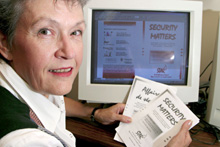Sex workers, academics work together on street smarts

Fran Shaver with the STAR pamphlets. After Sept. 30, they will be available on the website www. uwindsor.ca/star STAR is also releasing two reports, one on law, security and the wellbeing of sex workers, and another on exotic dancing.
Photo by Andrew Dobrowolskyj
Health and safety are important in any work environment, and the sex industry is no different. That’s why information flyers aimed to help sex workers work safer will be released this month in Montreal and Toronto.
The flyers are part of a project called STAR, for Sex Trade Advocacy and Research. There are five flyers, in English and French: Health Matters, Security Matters, Dancing Matters, Law Matters and Financial Matters.
Funding for the project was provided by SSHRC and the National Network on Environments and Women’s Health, one of four Centres of Excellence funded by the Women’s Bureau of Health Canada.
The principal investigator on the project was Jackie Lewis, of the University of Windsor. Eleanor Maticka-Tyndale and Concordia’s Fran Shaver were co-investigators.
Shaver, who headed the Montreal study, says this project was a team effort between academics and the community. “We pulled together as a partnership. These flyers represent sex workers educating other sex workers."
The researchers studied conditions faced by sex workers in Montreal and Toronto. Their results were used by advocacy groups like Stella and by individual sex workers to develop the content for the flyers.
For the study, 120 escorts, exotic dancers, masseuses and street workers in Montreal and Toronto were interviewed, as well as city councillors and sex worker advocacy organizations. In some cases, sex workers trained as researchers conducted the interviews.
The study showed that a variety of factors affect the health and safety of sex worker: whether the transactions are done on or off-street, on an in-call or out-call basis, and whether the sex worker is self-employed or works for a club, parlour or agency.
The flyers cover everything from how to stay healthy and dress warmly to strategies for when a client turns violent. In Security Matters there is information about how to screen a potential client over the telephone or on the street.
"You’re getting all that information laid out before you’re finalizing the deal," Shaver said. “You’re checking the back seat of the car when the car light comes on. You’re looking to see where the lock buttons are, which may be useful if you want to get out of the car."
When it comes to dealing with fear and stigma, Shaver sees the flyers as not only being educational for sex workers but also for the public.
"When they read these flyers, people will realize that sex workers are already taking safe sex into account."
Shaver says her intention has always been to get better information about the sex industry out to the public so that debate can be grounded in real understanding.
"What happens in the street is just a small part of the whole sex industry. We need to take a step back and look at the bigger picture if we’re going to come up with plans and programs to make a difference."